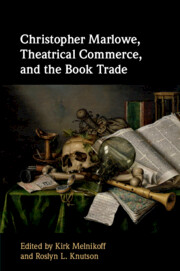Book contents
- Christopher Marlowe, Theatrical Commerce, and the Book Trade
- Frontispiece
- Christopher Marlowe, Theatrical Commerce, and the Book Trade
- Copyright page
- Dedication
- Contents
- Figures
- Notes on Contributors
- To the Reader
- Acknowledgements
- Notes on the Text
- Abbreviations
- Introduction
- Part I Marlowe at Work
- Part II Transmitting Marlowe
- Chapter 7 Making Marlowe
- Chapter 8 Making a Scene; or Tamburlaine the Great in Print
- Chapter 9 Marlowe’s Early Books: The Contention and a ‘Marlowe Effect’
- Chapter 10 Richard Jones, Tamburlaine the Great, and the Making (and Remaking) of a Serial Play Collection in the 1590s
- Chapter 11 Companionate Publishing, Literary Publics, and the Wit of Epyllia: The Early Success of Hero and Leander
- Chapter 12 Thomas Heywood and the Publishing of The Jew of Malta
- Part III Marlowe Received
- Bibliography
- Index
Chapter 11 - Companionate Publishing, Literary Publics, and the Wit of Epyllia: The Early Success of Hero and Leander
from Part II - Transmitting Marlowe
Published online by Cambridge University Press: 28 September 2018
- Christopher Marlowe, Theatrical Commerce, and the Book Trade
- Frontispiece
- Christopher Marlowe, Theatrical Commerce, and the Book Trade
- Copyright page
- Dedication
- Contents
- Figures
- Notes on Contributors
- To the Reader
- Acknowledgements
- Notes on the Text
- Abbreviations
- Introduction
- Part I Marlowe at Work
- Part II Transmitting Marlowe
- Chapter 7 Making Marlowe
- Chapter 8 Making a Scene; or Tamburlaine the Great in Print
- Chapter 9 Marlowe’s Early Books: The Contention and a ‘Marlowe Effect’
- Chapter 10 Richard Jones, Tamburlaine the Great, and the Making (and Remaking) of a Serial Play Collection in the 1590s
- Chapter 11 Companionate Publishing, Literary Publics, and the Wit of Epyllia: The Early Success of Hero and Leander
- Chapter 12 Thomas Heywood and the Publishing of The Jew of Malta
- Part III Marlowe Received
- Bibliography
- Index
Summary
- Type
- Chapter
- Information
- Christopher Marlowe, Theatrical Commerce, and the Book Trade , pp. 165 - 181Publisher: Cambridge University PressPrint publication year: 2018



